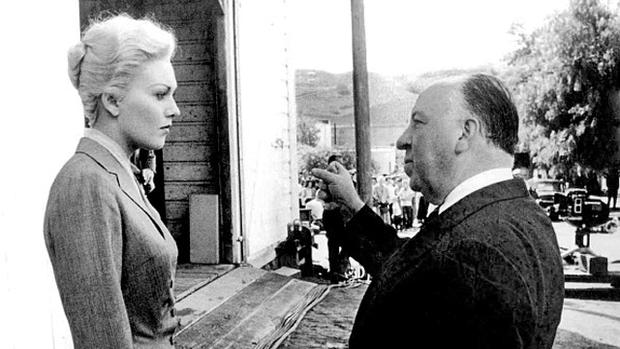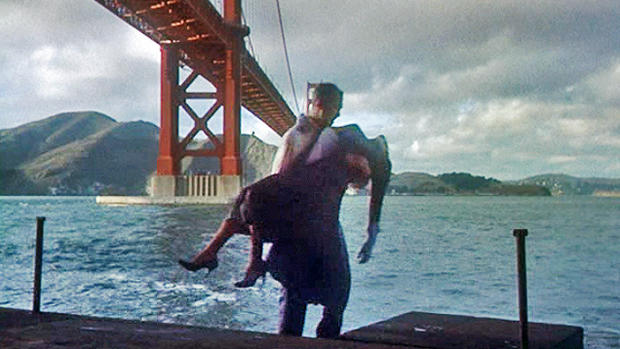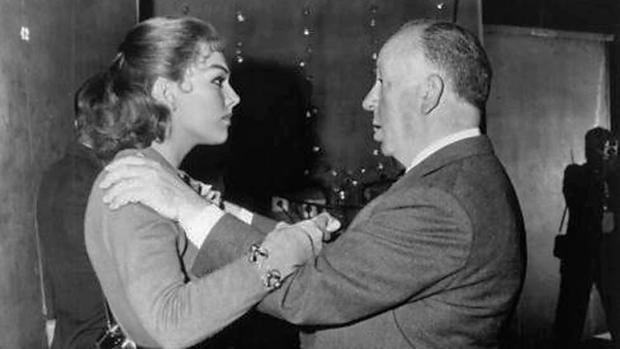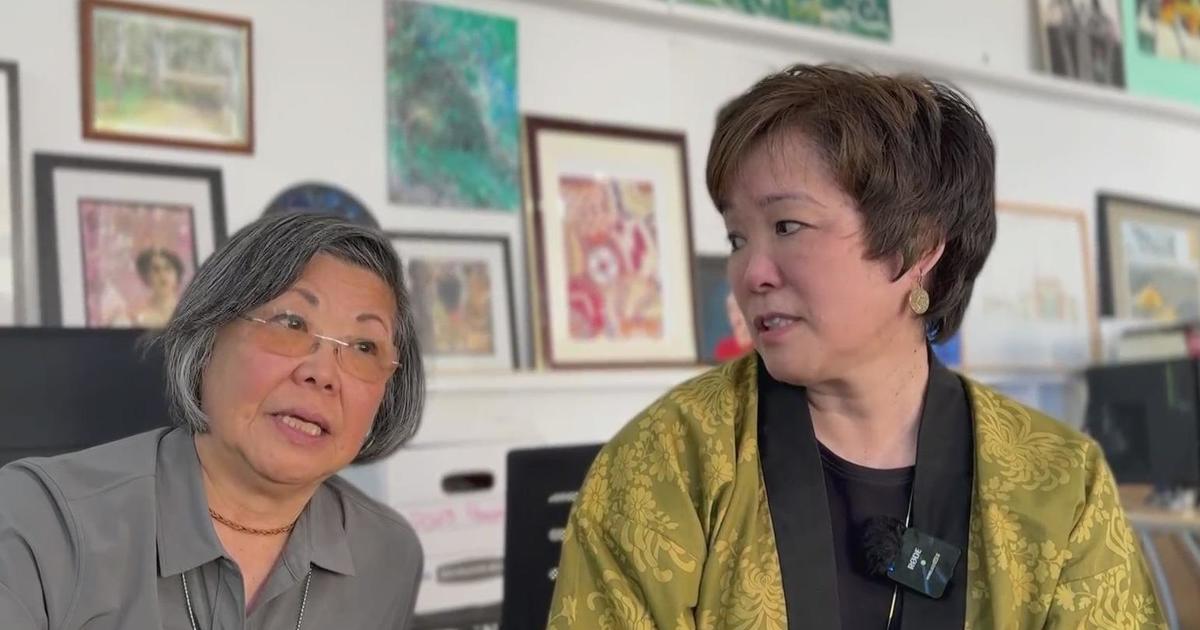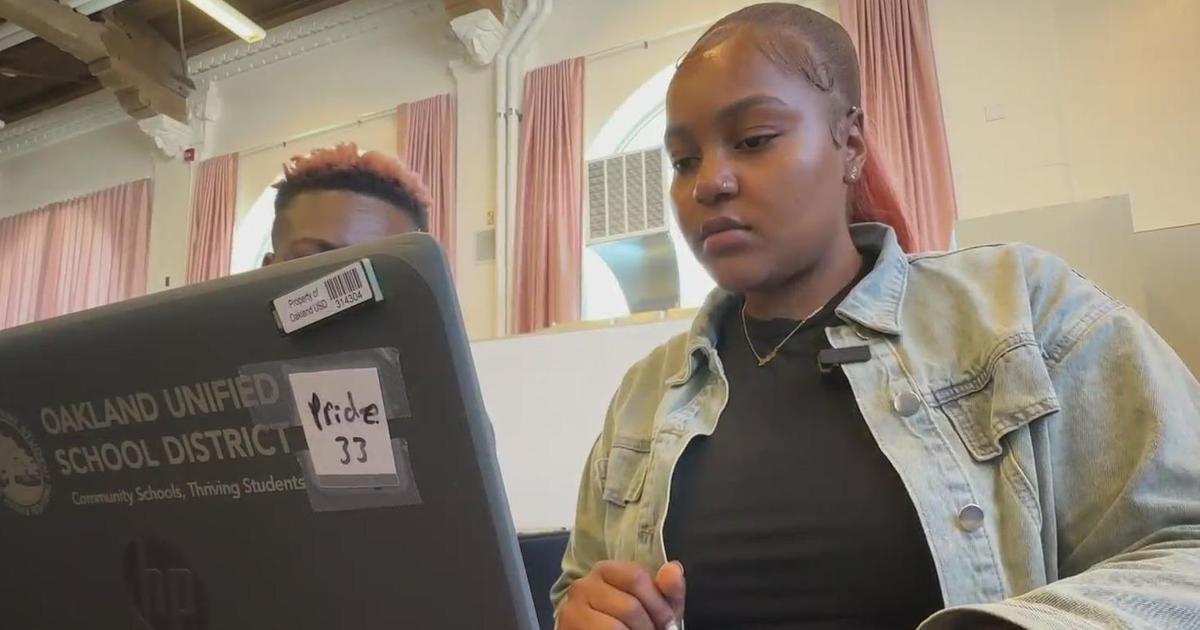60 Years Later, Kim Novak Reflects on 'Vertigo'
NEW YORK (AP) -- Last fall, on her ranch in southern Oregon, Kim Novak found herself doing what she calls "my own Me Too painting."
Novak, who turned 85 on Tuesday, had recently broken her left wrist -- her painting hand -- but was compelled enough to give it a try with her right. Seeing woman after woman come forward with their stories of harassment stoked Novak's own recollections. She titled the result -- a swirling, vibrantly colored abstraction of a menacing face looming above a woman -- "A Time of Reckoning."
"In that period, the same things went on. I never told these stories but my painting has it all," said Novak, speaking by phone from her 240-acre ranch, where she lives with her husband Robert Malloy, a retired veterinarian. "It was very cathartic, I'm sure just like the gals of today found it cathartic to tell their story."
Novak recently granted her first interview in several years to mark the 60th anniversary of Alfred Hitchcock's 1958 masterwork, "Vertigo." On Sunday, as part of the TCM Big Screen Classics series, "Vertigo" will be back in theaters (see FathomEvents.com for the 650 locations), with an encore on Wednesday, March 21.
The initial reviews for "Vertigo" were tepid. The box office was disappointing. But "Vertigo" -- entrancing, dreamlike, deranged -- has steadily grown in reputation over the years to become one of the most widely acknowledged masterpieces in film. In 2012, it even displaced "Citizen Kane," after a 50-year reign, as the top film on the Sight & Sound critics' poll.
"Vertigo," a movie overwhelmed by the sensation and fear of falling, keeps climbing higher.
And with the film's rise, Novak's performance, alongside Jimmy Stewart, has similarly surged in stature. Film critic David Thomson has called it "one of the major female performances in the cinema." Francois Truffaut, in his famed interviews with Hitchcock (who was critical of Novak in the role) tried to convince the director he had it wrong: "I can assure you that those who admire 'Vertigo' like Kim Novak in it."
Novak's performance in "Vertigo" is exceptional not only because it's two-fold -- she plays both the mysterious, suicidal Madeleine and Judy, whose similar appearance to Madeleine mystifies the Scottie (Stewart), the obsessed detective who had trailed Madeleine before her apparent death -- but because it's so representative of how male fantasies are projected onto women. In Scottie's elaborate efforts to recreate Judy as Madeleine, Novak recognized Hollywood's own manipulations of her.
"I identify so very completely with the role because it was exactly what Harry Cohn and what Hollywood was trying to do to me, which was to make me over into something I was not," says Novak, referring to the iron-fisted Columbia Pictures founder who contracted her.
"In the beginning, they hire you because of the way you look, obviously, and yet they try to change your lips, your mouth, your hair, every aspect of the way you look and the way you talk and the way you dress. So it was constantly fighting to keep some aspect of yourself, trying to keep some of you. You feel: There must have been something in you that they liked, and yet they wanted to change you."
That struggle makes Novak an important forerunner for today's actresses advocating for gender equality in post-Harvey Weinstein Hollywood. Signed to be Columbia's successor to Rita Hayworth and groomed as a blonde bombshell to rival Marilyn Monroe, Novak often recoiled from the way she was packaged. She refused to change her Czech last name and, ahead of "Vertigo," insisted on a higher salary. She had a three-year run as the top female star but left the movie business in 1965, returning only occasionally.
"What good is it just to be pretty?" she asked in 1955's "Picnic." "Maybe I get tired of only being looked at."
Novak's last film was 1991's "Liebestraum." After presenting at the 2014 Oscars many online, including Donald Trump, insulted her appearance. She responded that she would no longer hold herself back from speaking out against bullies.
Hitchcock wanted Vera Miles for "Vertigo" but Miles became pregnant shortly before production. Though Cohn thought little of the script, he agreed to lend Novak out to Paramount for the film. When she arrived, Hitchcock wasn't immediately impressed. "Miss Novak arrived on set with all sorts of preconceived notions that I couldn't possibly go along with," the filmmaker told Truffaut.
Novak could take some solace in not provoking Hitchcock's infatuation. In her 2016 memoir, Tippi Hedren ("The Birds," "Marnie") said that the director sexually assaulted her and threatened to ruin her career when she resisted.
"I never experienced anything like that. He never got that way with me," said Novak. "But there were other people."
Novak didn't discuss specific names or experiences -- "In that period, the same things went on," she said -- but spoke supportively of the studio boss who had so much influence over her career. "I never had a problem with Harry Cohn," she said. "He needed to be in control so much. He never wanted anyone to have anything on him." (Cohn is alleged to have insisted on sex from several female stars, including Hayworth, who detailed her refusals in a 1989 memoir.)
What's so remarkable about Novak's performance in "Vertigo" is how she expresses an apprehension that she's been sucked into a disturbed male world that desires some version of her that she isn't. Novak is uneasy in the role, a feeling she credits Hitchcock with purposefully inducing. The two initially disagreed on Madeleine's indelible outfit: a gray suit and black shoes.
"I was very uncomfortable and I told him so. I said, 'You know, I really don't like the outfit you chose me to wear. That gray suit is so uncomfortable. That's not something I would have chosen to wear,'" said Novak. "And he said, 'No, my dear, that's exactly what I want you to wear.' I thought: Of course, he wants Madeleine to feel uncomfortable."
"As Madeleine, it didn't feel right and that's what was right about it," added Novak.
But Novak also has "wonderful memories" of "Vertigo." She praises the freedom Hitchcock gave her to interpret her character, and rhapsodizes about Stewart as a co-star. "He was just the greatest person of all," she says.
Though Novak worked with many of the day's top directors -- Otto Preminger, Billy Wilder, George Sidney -- "Vertigo" remains the unquestionable apex of her career. Yet for Novak, her years in Hollywood remain a kind of deviation in her life. Before a cross-country modeling trip forever altered her trajectory, Novak attended the School of the Art Institute of Chicago on scholarship.
"I felt always that my talent was as an artist," she says. "I was pulled away from my true calling. When I left Hollywood, I went back to being an artist."
But just as "Vertigo" -- brilliant and perverse -- continues to haunt moviegoers six decades later, so it does for Novak.
"I always feel so much when I watch it. I feel like I did when I was making it, almost," she says. "I relive it somehow."
© Copyright 2018 Associated Press. All Rights Reserved. This material may not be published, broadcast, rewritten or redistributed
